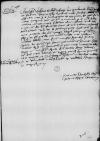List #364
Ioannes DANTISCUS do Lazarus [GYRLACH?]Valladolid, 1527-08-17
Rękopiśmienne podstawy źródłowe:
Pomocnicze podstawy źródłowe:
Publikacje:
| ||||||||||||||||
Tekst + aparat krytyczny + komentarz Zwykły tekst Tekst + komentarz Tekst + aparat krytyczny
Accepi hic paulo ante litteras tuas et
Ceterum volo, ut de pecuniis, quas habueris ex hoc anno praeterito, des domino
Datum ex

 BCz, 242, p. 112
BCz, 242, p. 112